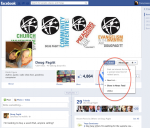According to numerous news outlets, scientists are about to unveil the Higgs boson — aka, the God Particle. Here’s NPR:
King Arthur had his quest for the Holy Grail. Physicists hope they are hot on the trail of the Higgs particle. You might call it the final puzzle piece, needed to complete our picture of how all the fundamental particles make up the universe.
Joe Lykken at the Fermi National Accelerator Laboratory in Illinois has been part of this quest since the early 1980s.
“Our former director, Leon Lederman, called the Higgs particle the God Particle,” Lykken says. “It was not meant to be a religious comment, it was meant to express our understanding of how the universe works. We think without a Higgs boson you can’t have a universe in the first place.”
At the very least, the universe would be incredibly boring. That’s because the Higgs particle, or Higgs boson, is supposed to explain why the atoms in the galaxies, the stars, the earth at our feet, and in our bodies, have mass. If they didn’t have mass, we wouldn’t exist as physical beings.
“We think the Higgs boson is a manifestation of the fact that the universe is filled with a force that we haven’t been able to detect yet, that gives other particles mass,” Lykken says. (via Is The Hunt For The ‘God Particle’ Finally Over? : NPR.)
I think that profound scientific discoveries always make doing theology more challenging, and therefore more fun, so I look forward to learning more about Higgs boson for my next book — after Why Pray? — which is tentatively titled, Wild God.
How do you think Higgs boson will challenge theology?












